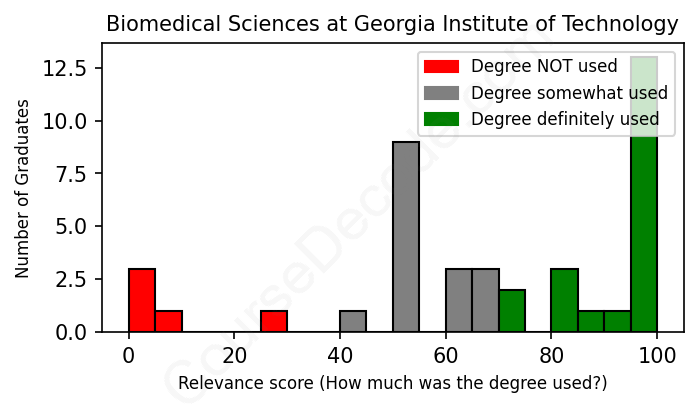
First, some facts. Of the Biomedical Sciences graduates from Georgia Institute of Technology we've analyzed , here's how many have used (or NOT used) their degree in their career:

These are estimates based on AI analysis of 41 LinkedIn profiles (see below).
The verdict? On par with the average. Overall, with an average relevance score of 67%, Biomedical Sciences graduates from Georgia Institute of Technology have about the same likelihood of finding work in this field as the average graduate across all fields:
And for comparison, here's the chart for all profiles we've looked at across all degrees.
Also, after graduating, 39% of these graduates have pursued further education other than another Bachelor's degree (such as a Masters degree or other), compared to the average across all profiles of 35%. This suggests you may need more than just a Bachelors degree to be competitive as a Biomedical Sciences graduate.
See the details:
|
Relevance score: 50% We think this person has gone into a career only somewhat relevant to their degree. We think this person has gone into a career only somewhat relevant to their degree.
DEGREE INFOGraduated in 2018 from Georgia Institute of Technology with a Bachelors Degree in Biomedical Sciences. No other secondary education since. JOB HISTORY SINCE GRADUATIONStructural Analysis Engineer Co-op L3 Technologies Jan 2018 - Aug 2018 Systems Engineer  Lockheed Martin Jun 2019 - Present ABOUTNo information provided. |
The top 10 most common jobs done by the graduates we've analyzed (ranked most common to least) are:
When looking at the job landscape for graduates with a degree in Biomedical Sciences from Georgia Tech, it's pretty clear that there's a mix of roles that fit well with their educational background and others that don’t quite align. A lot of graduates have gone into roles related to engineering, product management, and technical support, particularly within the biomedical industry. Positions like Manufacturing Engineer and Electrophysiology Technical Service Specialist are great examples where their training in biological systems and engineering principles directly contributes to their work. However, many find themselves in roles like Operations Manager or Account Executive, which, while they may benefit from some analytical skills or general scientific understanding, aren't focused specifically on biomedical knowledge. This hints at a broader trend where graduates are sometimes taking paths that stray from the intense biological science focus of their degree.
Overall, the relevance of jobs held by Biomedical Sciences graduates from Georgia Tech varies significantly. Roles like Research Assistants, Clinical Coordinators, and Manufacturing Engineers closely align with their field of study, leveraging specific knowledge and skills. Meanwhile, positions that lean more towards engineering management, sales, or general consulting often pull in skills that aren’t directly tied to the core biomedical sciences. So, while there's a solid portion of graduates doing work that directly reflects their education, many others find themselves in more generalized positions that may not utilize the depth of biological sciences training they've acquired. It just shows how versatile the degree can be, even if it sometimes leads them away from the lab and into more business-oriented roles.
Here is a visual representation of the most common words in job titles for Biomedical Sciences graduates (this is across all Biomedical Sciences graduates we've analyzed, not just those who went to Georgia Institute of Technology):

Graduates from Georgia Institute of Technology with a degree in Biomedical Sciences seem to have a pretty diverse range of career paths, but many of them find strong footholds in the biomedical and healthcare industries relatively quickly. For many, their first jobs after graduation are often in engineering roles related to medical technology or healthcare services, such as process engineers, manufacturing engineers, or clinical research coordinators. Companies like Abbott and Medtronic pop up frequently for these early-career roles, indicating that graduates are stepping into positions where they’re involved with technical specialties that directly impact health and medicine.
Fast forward five to ten years, and you’ll see that a lot of these folks have climbed the ladder to management or specialized roles, often still tied to the healthcare sector. Positions like Senior Clinical Specialist or Product Manager at leading companies reveal a pattern of growth that’s quite encouraging. However, there are also cases where some may venture into other areas, like consulting or even completely different fields, showing that a degree in Biomedical Sciences can be quite flexible. Overall, most alumni appear to be establishing successful careers closely linked to their educational background, but it's clear that not every path taken is strictly within the biomedical sciences lane. Some graduates have even embarked on unique journeys like starting their own businesses or pursuing advanced academic research, which adds a fun twist to their career trajectories!
Getting a Bachelor’s degree in Biomedical Sciences at Georgia Tech can be pretty challenging, but that’s not to say it’s impossible! The program dives deep into the sciences—think biology, chemistry, and even some engineering concepts—so you’ll definitely need to be ready for a lot of rigorous coursework and some intense studying. It can be tougher than an average degree since you're at a tech-focused school known for its strong emphasis on STEM, but if you’ve got a passion for biomedical topics and a solid work ethic, you’ll likely find your groove. Just be prepared to put in the time and effort, and you’ll come out of it with a lot of knowledge under your belt!
Most commonly, in the LinkedIn profiles we've looked at, it takes people 4 years to finish a Bachelor degree in Biomedical Sciences.
Looking at the jobs held by these Biomedical Sciences graduates from Georgia Tech, it seems like most of them have landed pretty decent gigs, especially those who graduated in the earlier years. For instance, the one who became Vice President of Product Development at Axion BioSystems is likely making some serious bank, given the progression from an entry-level Process Engineer to a VP role. Others at companies like Abbott and Medtronic also seem to have well-paying, steady jobs, especially in senior or specialized positions. However, some recent grads seem to be starting with internships or entry-level roles that might not pay as well initially, but could evolve into better opportunities with time. Overall, it looks like many of them are on a solid career path that can lead to good financial stability, but the pay levels can really vary based on experience and position.
Here is a visual representation of the most common words seen in the "about" section of LinkedIn profiles who have a Bachelor degree in Biomedical Sciences (this is across all Biomedical Sciences graduates we've analyzed, not just those who went to Georgia Institute of Technology). This may or may not be useful:

Here are all colleges offering a Bachelor degree in Biomedical Sciences (ordered by the average relevance score of their Biomedical Sciences graduates, best to worst) where we have analyzed at least 10 of their graduates:
| College | Score | Count |
|---|---|---|
 Western Michigan University Western Michigan University
|
81 | 17 |
 Marquette University Marquette University
|
78 | 29 |
 University of Michigan University of Michigan
|
77 | 10 |
 Colorado State University Colorado State University
|
77 | 19 |
 University at Buffalo University at Buffalo
|
75 | 18 |
 California Polytechnic State University-San Luis Obispo California Polytechnic State University-San Luis Obispo
|
74 | 13 |
 University of Connecticut University of Connecticut
|
74 | 15 |
 Texas A&M University Texas A&M University
|
73 | 59 |
 Auburn University Auburn University
|
71 | 26 |
 Northern Arizona University Northern Arizona University
|
71 | 15 |
 Rensselaer Polytechnic Institute Rensselaer Polytechnic Institute
|
70 | 10 |
 University of Central Florida University of Central Florida
|
69 | 26 |
 University of South Florida University of South Florida
|
68 | 48 |
 Georgia Institute of Technology Georgia Institute of Technology
|
67 | 41 |
 The Ohio State University The Ohio State University
|
64 | 14 |
 Rochester Institute of Technology Rochester Institute of Technology
|
64 | 12 |
 Case Western Reserve University Case Western Reserve University
|
63 | 12 |
 Grand Valley State University Grand Valley State University
|
59 | 35 |
 Arizona State University Arizona State University
|
58 | 12 |